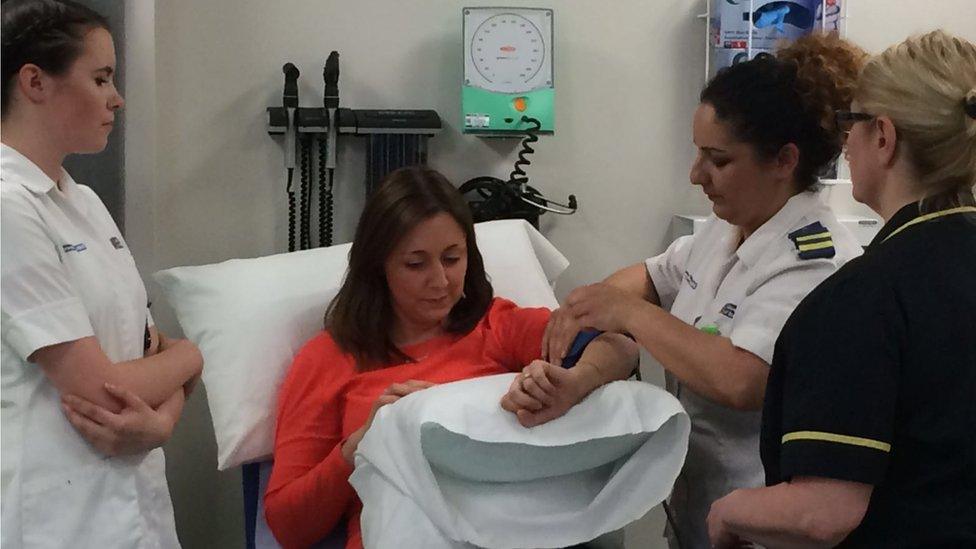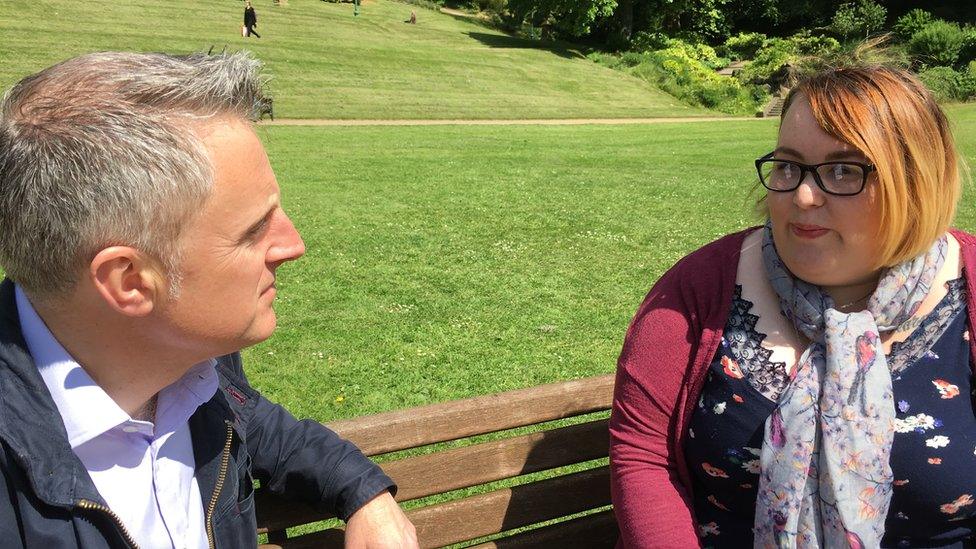Nurses on the march against plans to axe bursaries
- Published

Student nurses being put through their paces at Chorley Hospital in Lancashire
Hundreds of nurses and midwives are expected to join a demonstration in London on Saturday calling for a rethink of plans to scrap maintenance grants for students in England.
The Treasury says abolishing the grants, or bursaries, will allow many more nurses to be trained.
But a Royal College of Nursing survey claims two-thirds of nurses wouldn't have studied nursing without them.
They say it would make an existing staff shortage even worse.
Bursaries are a means-tested allowance paid to those healthcare students who qualify, to help with living expenses during their training.
Plans to scrap them were outlined by Chancellor George Osborne, as part of the government's Spending Review in November 2015.
At the time he said the move would free up around £800m a year in government spending and create up to 10,000 new training places.
But since then, nurses and other health workers have been campaigning against the axing of bursaries.
Student nurses are also going to have start paying tuition fees for their courses in the same way as other undergraduates - meaning they will have to take out a student loan.
Dream career
First year student nurse Ellie Archer has told the BBC that the bursary was vital in allowing her to pursue her dream career.
She already has one sizeable student loan from another undergraduate degree and says: "I really wanted to be a nurse and I can say without a doubt that if I had had to take out a loan to study to become a nurse, I would not have done it."

Student nurse Ellie Archer is about to finish her first year on a degree course
Ellie believes the intensity of a nursing degree means students need extra support.
"Because of the amount of time spent on a placement it is very, very difficult to pick up second jobs, so there isn't really any other way of getting an income other than having the bursary in place."
A model for the future?
There is already a model of what a future without bursaries may look like at Chorley Hospital in Lancashire, which is part of the Lancashire Teaching Hospitals NHS Foundation Trust.
Student nurses there, who are on a course run in conjunction with the University of Bolton, are the first in England to pay their own way and once they have successfully completed the course, they are guaranteed a job.
The trust's director of nursing and midwifery Gail Naylor explains: "We had 800 applicants for 30 places, so I think what that tells us is, there really is the demand out there.
"Students are looking for different ways to train and we've been really successful in that."
Student loan
The Lancashire course is not alone in being oversubscribed.
In 2014, there were 57,000 applicants for places on nursing degree courses, but the NHS in England could fund only 20,000 places.
The Royal College of Nursing says a survey of 17,000 nurses reveals that two-thirds of them would not have studied nursing if faced with the prospect of taking out a student loan.
RCN chief executive Janet Davies says: "We're concerned that perhaps we won't get the same diversity of people coming into nursing that we have currently, that having to take out a loan will put people off, particularly those people who are more mature, who may have had a career previously and who are coming into nursing as a second career."
Remove the cap
However, many of those who run nursing training courses believe there is a case for change.
Dame Jessica Corner, chairwoman of the Councils of Deans of Health which represents the universities that train nurses, says: "This change actually enables universities to open up training places.
"At the moment they are capped, really on the basis of affordability and estimates of what the NHS might need, which have clearly been wrong over many years.
"So over time we think training places will be expanded and that will be good news for the NHS with more nurses and allied health professionals graduating."
There is a shortage of qualified NHS nurses right across the UK.
So far these changes are only being proposed in England.
But faced with similar problems, politicians in Scotland, Wales and Northern Ireland will be watching very carefully to see what impact these changes will have.
- Published24 March 2016

- Published9 January 2016

- Published21 December 2015
